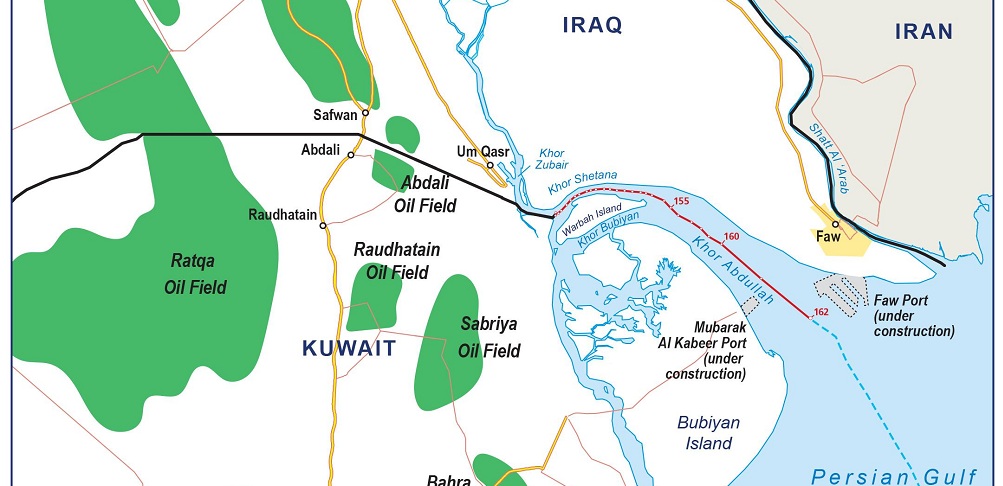Alwaght- Two weeks after Iraqi Supreme Court found the 2013 maritime agreement with Kuwait, dubbed Khor Abdullah Agreement, unconstitutional and scrapped it, the controversial ruling is now setting the context for a political dispute with this southern neighbor of Iraq in the Persian Gulf.
According to the Supreme Court of Iraq, for international treaties and agreements to be passed by the parliament, the vote of two-thirds of the lawmakers is required. However, the maritime agreement with Kuwait was approved by the simple majority of the MPs.
In January 2013, the Iraqi cabinet, headed by Prime Minister Nouri Maliki, approved an agreement that would determine the status of shipping in Khor Abdullah to end the long-running border dispute with Kuwait. The agreement, however, has always faced widespread criticism and objection on the Iraqi political stage.
Coming only two months after Kuwaiti Foreign Minister Ahmad Nasser Al Sabah visited Baghdad and announced agreements to complete the “demarcation of maritime boundary at mark 162, the court ruling struck as a surprise to the Kuwaitis.
The move drew objection of Kuwaiti lawmakers and media outlets. Foreign ministry released a statement, saying that the ruling could unleash a new crisis to the relations of the two neighbors. This warning is while signs of political tensions over borders between the two countries have been emerging in recent years.
What is Khor Abdullah Agreement?
The maritime boundaries between Iraq and Kuwait have always been a source of dispute between the two countries. After Saddam’s invasion of Kuwait in 1990, the UN in 1993 determined the maritime and land borders between the two countries. At that time, Iraq only accepted land borders determination, but the maritime borders remained open for dispute.
Baghdad has always demanded demarcation to ensure access to the Persian Gulf waters and maritime transportation routes which are needed economically and especially for oil exports.
Khor Abdallah is an area located in the extreme north of the Persian Gulf between Kuwait and Iraq and between the Kuwaiti islands of Bunyan and Warbah and Iraq’s Al-Faw Peninsula and extends to the territory of Iraq and is of strategic importance for Baghdad due it its proximity to Iraq’s Umm Qasr Port. This agreement led to the division of Khor Abdullah and the construction of new ports, especially the Mubarak Al Kabeer Port in Kuwait.
On the banks of the Persian Gulf, there are deep coastal cuts where sea water meets fresh water.
The UN resolution 833 divided Khor Abdullah equally between the two countries, but it did not specify entire 216-kilometer sea border. The arbitration was not accepted until 2013 after long negotiations between the two countries.
The Iraqi parliament approved the agreement earlier in 2013 amid massive opposition by other politicians.
The agreement has always been causing political controversy in Iraq since Iraqis believe that in this agreement they ignored their navigation corridor and its main ports were driven out in favor of the rival ports. Additionally, the agreement grants Kuwait the right to access territorial waters deep in Iraq, restricting the shipping and maritime trade and the rights of fishermen of Iraq.
In recent years, the Kuwaiti coast guard has sometimes seized Iraqi fishing boats for allegedly illegally entering Kuwaiti territorial waters.
After the Supreme Court’s decision, lawmaker Saud al-Saadi in an X, formerly Twitter, post said: “We say to Iraqi fishermen: do your fishing as you like. Khor Abdullah has returned to you and no one has the right to attack you.”
Also, last decade and after demarcation of land borders with Kuwait and installation of border poles, Iraq constructed a residential area for navy personnel that included 100 housing units in the Umm Qasr city on the border line. But Kuwait objected to the project and proposed an alternative one. The Iraqi side accepted the proposal and in 2020, Kuwait completed the alternative project including 228 housing units with all services. However, the process to remove the earlier houses is yet to be completed.
Also, in 2019, Iraq filed a lawsuit to the UN Security Council against Kuwait for applying geographical changes in the area beyond mark 162 for the purpose of economic development of the Fasht Al-Aij region.
Responding to the complaint, Kuwait said that Fasht Al-Aij facilities are inside the Kuwaiti territorial waters and it does not accept Iraqi case.
Kuwait relies on UN resolution and historical documents
Reacting to the Iraqi decision to unilaterally cancel Khor Abdullah agreement, Kuwait described the move illegal according to the UN resolution, adding that Baghdad is incapable of doing so.
Asked about the consequences of the Iraqis court’s decision, former Kuwaiti Intelligence Minister Saad bin Tafli al-Ajami told Al-Hurra news that Kuwait has nothing to do with Iraqi judiciary’s ruling.
He added that this is an Iraqi domestic issue, adding that demarcation of the maritime navigation borders between the two countries was finished with the UN resolution.
Also, Abdul Karim Al-Kandari, a member of the Kuwaiti parliament, announced in a statement that the revocation of this agreement by the Iraqi Supreme Court “has no value at the international level.”
According to the Kuwaiti MP, Nouri al-Saeed, then Iraqi PM, in 1932 and while Iraqi was under the British mandate wrote to the British High Commissioner in Palestine and Iraq Arthur Grenfell Wauchope and determined the Iraqi and Kuwaiti borders and that the resolution 833 is based on this document.
Two possible scenarios
Given the legal nature of the dispute, there are two possible scenarios for a solution.
First scenario: Negotiating a new deal: Given the efforts of the Iraqi Prime Minister Mohammed Shia al-Sudani for strengthening ties to the (Persian) Gulf Cooperation Council members and also given the bloc’s supportive resolution to Kuwait, new negotiations for addressing Iraqi concerns about fishing and trade are likely to form. A negotiated new deal then will go to the Iraqi parliament for two-thirds vote of the parliament. It is noteworthy that the Supreme Court’s ruling is motivated by unconstitutionality of the process of passing the agreement in the parliament and it has not commented on the terms of the agreement.
Second scenario: Resorting to international arbitration: If dialogue fails to produce a solution and their dispute compounds, Kuwait is likely to refer to the International Tribunal for the Law of the Sea.



























